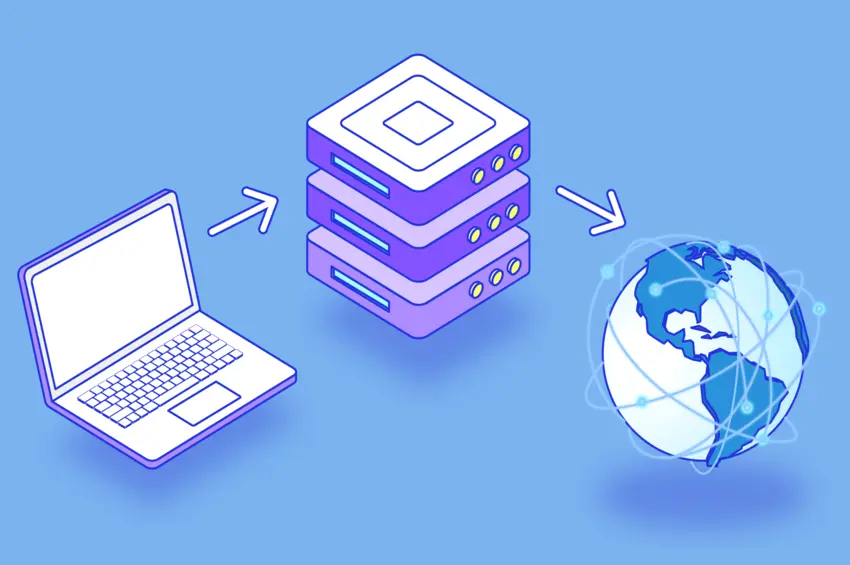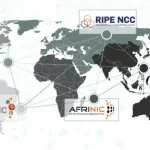- Proxy Servers: An indispensable dual shield for security and anonymity, evolving to meet rising threats and privacy concerns.
- Interview with Atom: Proxy expert shares insights on the future, challenges, and innovations in the dynamic Proxy Server field.
Network security and privacy are paramount. Proxy servers play a crucial role by ensuring users a dual shield of security and anonymity. These devices act as bridges, hiding real IP addresses, encrypting data, and enforcing access controls.
Initially geared towards speeding up internet access and conserving bandwidth, Proxy Servers have evolved to address rising network threats and heightened privacy concerns. They now serve as guardians, preserving user privacy, thwarting malicious attacks, and adding an extra layer of security for safer internet navigation.
The applications of proxy servers have diversified, finding use in corporate networks for global business demands and catering to individual users. Whether for international e-commerce expansions or personal anonymous web browsing, Proxy Servers are indispensable.
Despite technological evolution, the Proxy Server field faces challenges like IPv4 depletion and the shift to IPv6, impacting IP address availability. The increasing frequency of network attacks calls for continual improvement in proxy server security mechanisms.
Also read: What are IP addresses and why they are important?
While Proxy Server technology is mature, emerging ISP proxy technologies posing as Carrier ISPs offer stable IP addresses, gaining popularity. Looking forward, innovation in the Proxy Server field is expected to meet the evolving network landscape and user requirements.
I had the privilege of interviewing Atom, an expert in the Proxy field with many years of experience. He shared his firsthand experiences and unique insights into the future development of Proxy Servers. These insights highlight the critical role Proxy Servers play as the “invisible force” in the online world, supporting not only business, security, and privacy but also seeking innovation and progress amidst technological challenges and evolving demands.
Personally, I believe that when the entire network transitions to IPv6, IP addresses will cease to be a scarce resource. IPv6 inherently provides a wealth of security and privacy features, posing significant challenges and impacts on the Proxy Business. I hope that day arrives a bit later.
Could you please introduce yourself and share your work experience in the Proxy Server domain?
Atom: I got involved with the internet around 1994, making me one of the early internet users. With nearly 15 years of experience in the networking industry, I’ve also taught at a university for 2 years. Later, due to a fortuitous opportunity introduced by a friend, I ventured into the IP/Proxy Business, gradually turning it from a side job into a primary occupation. Currently, I manage two companies in North America, serving as an upstream supplier for many Proxy providers.
How did you get into the Proxy Server field?
Atom: It’s quite an amusing story. In the bustling years of 2018 and 2019 when Supreme and AJ were making waves, I was still teaching at university. A friend reached out, telling me about his Brooklyn buddy who had a bot capable of snagging Supreme box logo hoodies at retail prices. The idea was to resell them for a tidy profit. However, the snag was the lack of stable and fast proxies. Given my expertise in IP networks due to my job, they sought my assistance. My initial reaction was that it sounded too unreliable, so I promptly declined.
Later on, they flew back from New York to personally discuss the matter with me. I tentatively agreed to give it a shot. I analyzed and tested proxies provided by other market players, only to find them expensive, cumbersome, and often shared rather than dedicated. On a whim, I deployed the first proxy server in Chicago, and lo and behold, the speed and stability surpassed all existing products at the time. And then… it just took off. Looking back, it feels a bit like breaking bad, unexpectedly stepping into this domain. Good times, huh?
For those not quite familiar, could you briefly explain what a Proxy Server is?
Atom: What is its specific role in the network? Imagine you really want to snag a pair or maybe a hundred of Travis Scott AJ1s at retail, a ticket to a Jay Chou concert, or perhaps you’re aiming to grab all the premium items restocked on the Hermes official website. In such scenarios, you first need a bot (an automated program), and then you require a plethora of proxies. Proxies provide the anonymous attribute in the network – one person, one computer, and just one IP address (or even multiple people sharing one). With proxies, you can easily alter and disguise your IP address, transforming one into many, adopting various personas to place orders on websites, significantly boosting your chances of success.
Furthermore, proxies offer privacy. When you don’t want others to know your real IP address, which could pinpoint your exact location, you can use proxies to forward your internet traffic. From an outsider’s perspective, they see the proxy’s address, not yours. This implies that proxies, in many scenarios, have given rise to some grey industries, and strict control and supervision by proxy providers are essential.
What are the differences between a Proxy Server and a Firewall, and how do they collaborate?
Atom: Although both are intermediate devices that network traffic may pass through, they are distinct concepts. As I mentioned earlier, a proxy server is essentially a collection of multiple proxies on a single server. It plays the role of hiding a user’s IP and some other information, “proxying” the user’s traffic. While it can, it usually doesn’t heavily interfere with the client’s original traffic and business.
On the other hand, a Firewall is like the entrance/exit point of a network. It often requires deploying numerous policies to inspect which traffic is legitimate and which is not, filtering and rejecting unauthorized traffic to protect our network.
To put it in simpler terms:
A Firewall is like the security guard of a residential community, responsible for checking everyone who wants to enter, ensuring they are legitimate and safe.
A Proxy Server is like your personal assistant, representing you in communication with the outside world, hiding your identity and managing information.
Currently, there are various types of Proxy Servers in the market, such as HTTP proxies and SOCKS proxies. Could you provide an overview of the main differences between them?
Atom: In simple terms, an HTTP proxy primarily handles the traffic for HTTP/HTTPS, which is the type of proxy we use when accessing web pages. For instance, if you want to visit Google through your browser without revealing that you’re in the United States, you can use a proxy server located in Dubai. When the traffic is forwarded through the Dubai proxy server, Google perceives you to be in Dubai. This is the essence of an HTTP proxy.
On the other hand, SOCKS proxies typically don’t concern themselves with the content being proxied, meaning they impose fewer restrictions on the traffic they handle. For example, in scenarios like using a gaming accelerator where you want to play the Korean version of League of Legends from China, and the server only accepts Korean IP addresses, you would need a SOCKS proxy located in Korea.
In a nutshell, HTTP proxies are primarily used when accessing web pages through a browser, while SOCKS proxies can be applied in a broader range of scenarios, such as instant messaging software, gaming, and more.
For different types of network traffic, what kind of Proxy Server is more suitable?
Atom: In general, Proxy Servers with the most stable and superior server performance, larger bandwidth, and lower latency are suitable for handling all types of network traffic. The IP address on the proxy server is crucial, with users often willing to pay a premium for an ISP-type proxy server that appears more like a “real person.” This is because these IP addresses seem to originate from large ISPs like AT&T, SKT, Vodafone, SoftBank, and others, rather than a small data center. This makes it easier for websites to recognize and accept the traffic, rather than blocking access.
What are the main uses of Proxy Servers in enterprise networks? How do they differ from proxies used by regular users?
Atom: In the current landscape, Proxy Servers are widely employed in the realm of international e-commerce, especially by major players. For instance, a large e-commerce company expanding its presence on TikTok in Dubai, whether for regulatory compliance or localization purposes, requires a multitude of local IP addresses. In most cases, such enterprises need multiple local or even global proxy servers to meet their business requirements. Compared to regular users, they leverage a more extensive array of IP addresses, along with servers and bandwidth resources that are notably more stable and reliable.
In terms of cybersecurity, what functions and advantages does a Proxy Server offer?
Atom: A Proxy Server is a double-edged sword in network security. It inherently provides privacy for IP addresses; traffic passing through a proxy server is anonymized, safeguarding the personal privacy of the visitor. On the flip side, this privacy can also serve as a shield, concealing the true information of some network attackers or scammers, providing cover for certain illicit activities. Hence, whether a proxy is secure or not depends on how it’s controlled. As I mentioned earlier, Proxy Servers require strict control and supervision to harness their positive impact.
Could you talk about the working principles of a Proxy Server? How does it handle requests and responses?
Atom: While there are some differences in the working principles based on different protocols (HTTP and SOCKS), the overall process is quite consistent:
User initiates traffic to reach the Proxy Server.
The Proxy Server replaces the user’s original IP address and other necessary information, essentially “proxying” the user’s original traffic and establishing communication with the target website.
When the target website responds, the response reaches the Proxy Server first. After processing by the Proxy Server, it is then forwarded back to the user.
In essence, a Proxy Server acts as a complete intermediary, embodying the role of Man in the Middle (MIM). Typically, Proxy Servers do not support anonymous access. This means that user-initiated traffic often requires an additional step of authentication and authorization. This involves determining who can access, who cannot, and what specific content is accessible or restricted.
In large-scale networks, how do you achieve high availability and load balancing for Proxy Servers?
Atom: Your question is quite professional and insightful. In extensive networks, the primary challenge lies in ensuring the high availability (HA) and load balancing (LB) of Proxy Servers. Currently, we manage around several hundred proxy servers and over 500,000 IP addresses.
Typically, we consider server clustering, link aggregation for bandwidth, and load balancing. Multihoming on BGP (Border Gateway Protocol) is also employed to address the challenges mentioned above.
What role does a Proxy Server play in user privacy and security? What are some best practices to ensure the protection of user data?
Atom: A Proxy Server can conceal a user’s actual IP address, safeguarding their identity and location information from websites or third parties trying to track them. Additionally, proxies can block malicious websites or content, providing an extra layer of security for online browsing.
Certain proxies, especially HTTPS proxies, can encrypt the data transmission between the client and the proxy server, enhancing the security of data transfer.
How do you deal with potential security threats and attacks on a Proxy Server?
Atom: In the two months leading up to your interview, we’ve been continuously enduring DDoS attacks from assailants. Network attacks are a complex issue faced by any network administrator, and Proxy Server managers are no exception. In certain domains, where we make it easier for our clients to succeed, it inevitably attracts targeted network attacks.
Typically, we deploy additional security devices such as firewalls, IPS, etc., in our network to identify and cleanse abnormal attack traffic. We also actively collaborate with upstream operators to comprehensively mitigate network attacks. This often entails a higher technical threshold and increased resource investment. However, the foundational requirement for a smoothly running network is stability. Consequently, effectively addressing and neutralizing sustained network attacks is an imperative challenge that must be faced.
What challenges might Proxy Server technology face in the future? Are there any emerging trends or technologies that could impact the direction of Proxy Server development?
Atom: As we all know, IPv4 resources have long been depleted, leading to a proliferation of scenarios using IP addresses/Proxies. Personally, I believe that when the entire network transitions to IPv6, IP addresses will cease to be a scarce resource. IPv6 inherently provides a wealth of security and privacy features, posing significant challenges and impacts on the Proxy Business. I hope that day arrives a bit later.
Regarding emerging technologies in the Proxy Server field, what aspects are you looking forward to or paying attention to?
Atom: In reality, Proxy technology is already a very mature field, with few emerging technical points left to explore. However, from a business usage perspective, IP addresses from ISP proxies (where conventional data center proxies are disguised as Carrier ISPs through technology) are more popular among users in the current market.
From the interview content, it is evident that delving into the impact of IPv6 transition on the Proxy Server domain requires us to recognize that, while the promotion of IPv6 addresses the issue of IPv4 resource depletion, it also brings about a series of complex challenges and drawbacks. Firstly, during the coexistence of IPv4 and IPv6, Proxy Servers need to simultaneously support both protocols, increasing the difficulty and complexity of network management and demanding higher standards for high availability and load balancing.
With the extensive implementation of IPv6, Proxy Servers gain enhanced flexibility in acquiring IP addresses, accompanied by novel privacy and security concerns. The sheer abundance of IPv6 addresses complicates user supervision and tracking, fostering an environment where network attackers can stealthily operate. Consequently, Proxy Servers face heightened requirements for security and compliance.
In the IPv6 landscape, traditional IP address filtering and defense mechanisms may prove less effective. This exposure leaves Proxy Servers vulnerable to sophisticated and elusive attacks, necessitating ongoing enhancements to defense protocols.
Moreover, the global proliferation of IPv6 might incite a profound transformation in global network architecture. This transformation poses substantial challenges to the geographical positioning, network topology, and global load balancing of Proxy Servers. In adapting to this new network paradigm, conventional design and optimization strategies warrant meticulous reassessment.
The challenges wrought by the IPv6 transition compel the Proxy Server industry to contemplate and act. Proactive measures are imperative to acclimate to the evolving network landscape and technological requisites. As the future of networking unfolds, Proxy Server providers must uphold innovation, elevate network security standards, and ensure the continued delivery of stable and efficient proxy services in the IPv6 era.









